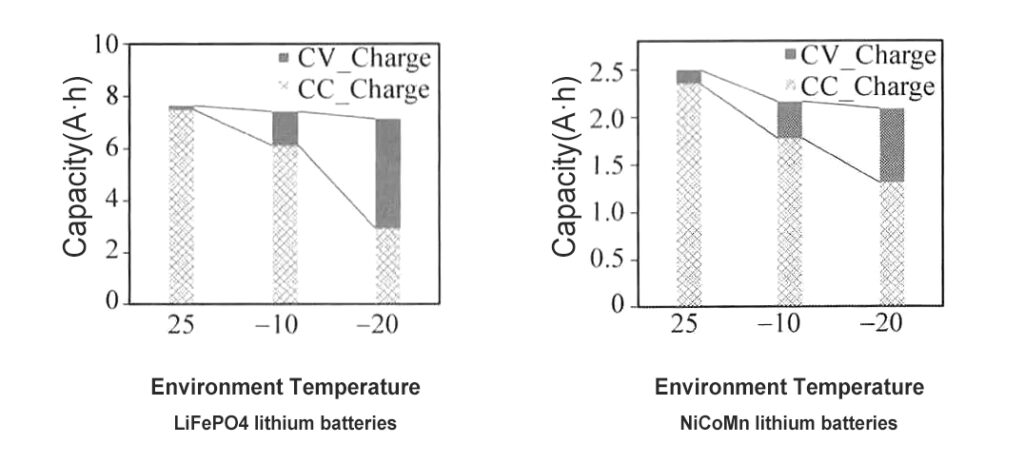Does putting the batteries in the freezer or fridge can prolong battery life? We all know, putting vegetables and fruits in the refrigerator can delay the food from turning rancid, because the low temperature inhibits the reproduction of bacteria.
But putting the battery in the freezer or refrigerator, the principle is obviously different.

How Does Low Temperature Affect Battery Life?
Lower temperatures slow down molecular motion, slowing down chemical reactions inside the battery. But it is not the lower the temperature, the better. The most suitable working temperature range of lithium ion is 0~45 degrees. When the temperature is lower than zero, the internal resistance of the battery increases, the electrochemical reaction speed slows down, and the polarization internal resistance is rapid. Increase, the battery discharge capacity and discharge plateau decrease, affecting the output of battery power and energy.
Below is the picture to show the capacity influence in different temperature.

For normal lithium batteries, when the temperature reach -20℃, the capacity only have half of the total capacity.
The Reason Why Low Temperature Will Reduce The Capacity Of Lithium Batteries?
- The ionic conductivity of the electrolyte inside the battery is too low,
- The electrochemical reaction rate of the battery electrode decreases at low temperature,
- Decreased conductivity of SEI film on the surface of graphite particles of battery anode at low temperature
- The solid-phase diffusion coefficient of lithium ions in the graphite material particles of battery anode is too low at low temperature
Also there are the most important points that we need notice, the moist environment will cause condensation on the batteries. This in turn will lead to rust or other damage. Avoid putting batteries under extreme temperatures at all times.
Can You Recharge Batteries In The Freezer?
If your battery is a lithium battery, this approach is obviously not wise. Like humans, lithium ions are lazy in cold environments. Charging your phone in cold air won’t do your battery any favors, it will slow down the charging rate and extend your charge time.

How to Store Lithium Batteries For Winter?
After fully charging your batteries to 14.4V. Then, completely disconnect them from any kind of power source.
You can do this by manually disconnecting the negative cable, or you can disengage the disconnect switch that leads to your electrical system. It’s important to ensure that your batteries are truly disconnected.
When left fully charged and in the right storage conditions, you should be able to come back to a fully functional battery after even a year of storage, as it should only drain 2%-3% each month. Just make sure to keep the storage environment as dry as possible.
Batteries stored for a long time (more than 3 months) must be placed in a dry and cool place.
And the most suitable storage environment is as follows:
Temperature : 23 ± 5 °C
Relative humidity: 65 ± 20%.
Charging environment: 0℃~+40℃
Discharge environment: -10℃~+60℃
How to Protect and Keep Your Batteries Functioning in Cold Temperatures
Lithium batteries work much better at low temperatures than lead acid batteries for most batteries. For extremely low temperature environments (temperature less than -20℃), we should use low temperature heating batteries, with a self-heating system inside, which can completely avoid most common battery strikes.
In order to achieve this function, we installed a hot starter in the lithium battery. The technology incorporates an internal heating system that allows charging and discharging in cooler climates and extends the temperature limits of the battery management system (BMS). The heating element is easy to use and can be enabled and disabled with a switch to prevent accidental use. They are also easy to prepare for long-term storage.
In addition, if you don’t mind the high price, you can also use lithium titanate batteries, which have a good advantage of being able to operate at extremely low temperatures (-50℃). In this blog, we compare ordinary lithium batteries and lithium titanate batteries for reference.
Tips If You Put The Batteries In Freezer?
1. Your fridge needs to be a dry environment (some older fridges can be damp), or the battery casing or terminals may rust causing toxic leaks that you really don’t want near your food.
2. Do not use a battery straight from the fridge, allow it to warm up gradually to room temperature (a few hours is needed for a unit to warm right through).
3. Don’t try to accelerate this warming process (say by putting it beside a sunny window), as this will cause the outer parts of the battery to become too hot and excessive heat accelerates self-discharge.
4. While the battery is warming up, keep it in a well ventilated area to avoid condensation which could cause shorts or rusting.
5. For everyday usage, don’t get too hung up on it. The benefits are very small unless you are talking about commercial storage to extend shelf life.





